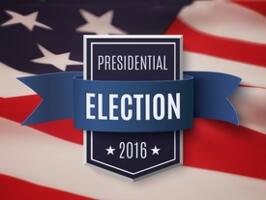Is There Silent Trump Support That Pollsters Are Missing?
Some have suggested that Donald Trump has hidden support among voters who are unwilling to say publicly where they stand because they’re fearful of criticism. We won’t know for sure until Election Day, but Republicans are clearly more reluctant than Democrats this year to say how they are going to vote.
A new Rasmussen Reports national telephone survey finds that 17% of Likely Republican Voters are less likely this year to let others know how they intend to vote compared to previous presidential campaigns. Just 10% of Likely Democratic Voters say they are less likely to tell.
Among voters not affiliated with either major party, 25% say they are less likely this year to say publicly which presidential candidate they will vote. Unaffiliateds have leaned in Trump’s direction in recent weeks in our White House Watch survey but also have been the biggest supporters of Libertarian candidate Gary Johnson. (To see survey question wording, click here.)
Clinton and Trump have been running nearly even in our surveys for weeks. When either of them takes a lead, it’s generally been within our +/- 3 percentage point margin of error.
Fifty-two percent (52%) of Democrats say they are more likely to let others know how they intend to vote this year, compared to 46% of Republicans and 34% of unaffiliated voters. Thirty-seven percent (37%) of Democrats, 32% of Republicans and 38% of unaffiliateds feel about the same when it comes to declaring their vote publicly as they have in past presidential election cycles.
The reluctance among GOP voters to speak out also may be due in part to the divisive primary battle that led to Trump’s nomination, with many establishment Republicans publicly rejecting the party’s chosen nominee. Sixty-six percent (66%) of Republicans believe that most top GOP leaders do not want Trump to be elected president of the United States. But only 27% of Republicans now believe the political attitudes of the party’s voters match up with those of party leaders.
(Want a free daily e-mail update? If it's in the news, it's in our polls). Rasmussen Reports updates are also available on Twitter or Facebook.
The survey of 1,000 Likely Voters was conducted on August 25 and 28, 2016 by Rasmussen Reports. The margin of sampling error is +/- 3 percentage points with a 95% level of confidence. Field work for all Rasmussen Reports surveys is conducted by Pulse Opinion Research, LLC. See methodology.
[Rasmussen Reports analysts Amy Holmes and Fran Coombs are available for interested media. Please call 732-776-9777 ext. 205 for interviews.]
Most major media outlets have been strongly critical of many of Trump’s comments and positions. Voters continue to strongly believe that the media is more interested in controversy than in the issues when it comes to the presidential race. Among voters who support Trump, 76% think the media is blowing up his comments out of proportion. But 80% of Clinton supporters say Trump is careless with his comments.
Men are a bit less likely this year to say publicly whom they will vote for.
Voters under 40 are more likely than their elders to be holding back their Election Day choice. This is a potential area of worry for Clinton since younger voters are essential to her win.
A plurality (47%) of blacks say they are just as likely this year as any other year to say publicly how they are going to vote. Whites and other minority voters are more likely to let others know.
Twenty percent (20%) of both conservative and moderate voters are less likely to reveal their choice for president this year. Only 10% of liberals say the same.
A majority of voters believe the media, not the candidates, are setting the agenda this presidential election cycle.
Despite heavy criticism by Clinton and by the media, Trump’s recently announced plans for restricting immigration from terrorist countries and for ending U.S. nation-building efforts in the Middle East are supported by most voters.
After initially supporting the Trans-Pacific Partnership, Clinton under pressure from primary rival Bernie Sanders came out against the new trade deal endorsed by President Obama. Trump has long been critical of the TPP, NAFTA and other major free trade agreements, saying they have hurt the economy and taken away U.S. jobs. Voters are not big fans of these free trade deals, and Trump is hoping to peel away younger Sanders supporters from Clinton’s camp.
Generally speaking, when it comes to national security, the economy and other major issues, voters expect Clinton to continue Obama's policies and Trump to change them, for better or worse.
The economy remains the number one issue for all voters this election cycle, but Republicans are a lot more worried about national security than Democrats and unaffiliated voters are.
Additional information from this survey and a full demographic breakdown are available to Platinum Members only.
Please sign up for the Rasmussen Reports daily email update (it’s free) or follow us on Twitter or Facebook. Let us keep you up to date with the latest public opinion news.
The survey of 1,000 Likely Voters was conducted on August 25 and 28, 2016 by Rasmussen Reports. The margin of sampling error is +/- 3 percentage points with a 95% level of confidence. Field work for all Rasmussen Reports surveys is conducted by Pulse Opinion Research, LLC. See methodology.
Rasmussen Reports is a media company specializing in the collection, publication and distribution of public opinion information.
We conduct public opinion polls on a variety of topics to inform our audience on events in the news and other topics of interest. To ensure editorial control and independence, we pay for the polls ourselves and generate revenue through the sale of subscriptions, sponsorships, and advertising. Nightly polling on politics, business and lifestyle topics provides the content to update the Rasmussen Reports web site many times each day. If it's in the news, it's in our polls. Additionally, the data drives a daily update newsletter and various media outlets across the country.
Some information, including the Rasmussen Reports daily Presidential Tracking Poll and commentaries are available for free to the general public. Subscriptions are available for $4.95 a month or 34.95 a year that provide subscribers with exclusive access to more than 20 stories per week on upcoming elections, consumer confidence, and issues that affect us all. For those who are really into the numbers, Platinum Members can review demographic crosstabs and a full history of our data.
To learn more about our methodology, click here.





